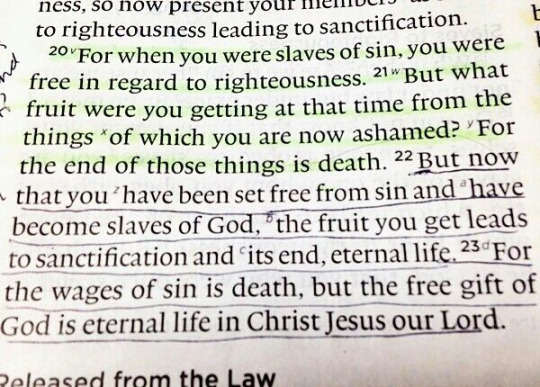Text
Romans 7:5
Romans 7:5 “When we were in the flesh.” Under the law, we did not bear fruit to God. Instead we bore “fruit to death,” because the law “aroused” the “passions” of sins within us. “To bear fruit to death.” Paul will explain this problem of the law more fully in Romans 7:7-14. But now we see his point – that we only come fully to the place of bearing fruit for God when we are free from the…

View On WordPress
0 notes
Text
Romans 7:4
Romans 7:4 “You also have become dead to the law through the body of Christ.” In Romans 6:3-8, Paul carefully explained that we died with Jesus and we also rose with Him, although Paul there only spoke of our death to sin. Now he explains that we also died to the “law.” Some might think, “Yes, we were saved by grace, but we must live by law to please God.” Here Paul makes it plain that believers…

View On WordPress
0 notes
Text
Romans 7:1-3
Romans 7:1-3. Romans 7:1-3 “The law has dominion” In Romans 6:14, Paul told us that “you are not under law but under grace.” After the discussion in Romans 6:15-23 regarding practical implications of this, he now explains more completely how it is that we are no longer under the dominion of the law. “That the law has dominion over a man.” The ancient Greek wording here has no word “the” before…
View On WordPress
0 notes
Text
Romans 6:19-23 (Part 2 of 2)
Romans 6:19-23 How to keep from enslaving ourselves (Part 2 of 2). “For when you were slaves of sin, you were free in regard to righteousness.” Paul’s point is almost humorous. When we were “slaves of sin,” we were free all right – “free in regard to righteousness.” Some freedom! “What fruit did you have then.” To walk in victory over sin we must think rightly about the “fruit” of sin. To say,…

View On WordPress
0 notes
Text
Romans 6:19-23 (Part 1 of 2)
Romans 6:19-23 How to keep from enslaving ourselves (Part 1 of 2). “I speak in human terms because of the weakness of your flesh.” The Apostle Paul apologized for using slavery as an illustration, because it was so degrading and pervasive, and especially because many of his Roman readers were slaves. Yet he knew this was an accurate and meaningful illustration. “You presented your members… so now…

View On WordPress
0 notes
Text
Romans 6:18 (Part 2 of 2)
Romans 6:18 Why not then, occasionally sin? Because sin is not our master, and we no longer serve it (Part 2 of 2). “Set free from sin.” This means that we never have to sin again. Though sin is inevitable until our flesh is resurrected in glory, it isn’t because God has designed a system by which we must sin. Sinless perfection in this body is an illusion. 1John 1:8 makes this clear: “If we say…

View On WordPress
0 notes
Text
Romans 6:18 (Part 1 of 2)
Romans 6:18 Why not then, occasionally sin? Because sin is not our master, and we no longer serve it (Part 1 of 2). “Having been set free from sin.” What does it mean to be “free from sin” and to become a slave “of righteousness?” It means that sin is no longer your boss or your master. Now “righteousness” is your boss, so serve “righteousness” instead of sin. It isn’t right to think about…

View On WordPress
0 notes
Text
Romans 6:16-17 (Part 2 of 2)
Romans 6:16-17 Spiritual principles we need to understand in order to answer the question (Part 2 of 2). “That form of doctrine.” This phrase is part of a beautiful picture. The word “form” describes a mold used to shape molten metal. The idea is that God wants to shape us – first He melts us by the work of the Holy Spirit and the Word of God. Then He pours us into His mold of truth – “that form…

View On WordPress
0 notes
Text
Romans 6:16-17 (Part 1 of 2)
Romans 6:16-17 Spiritual principles we need to understand in order to answer the question (Part 1 of 2). “To whom you present yourselves slaves to obey, you are that one’s slaves.” Whatever you present yourself to obey, you become its slave. For example, if I obey my appetite constantly, I am a slave to it. So we have a choice in our slavery- “sin leading to death” or “obedience leading to…

View On WordPress
0 notes
Text
Romans 6:15
Romans 6:15 “Shall we sin because we are not under law but under grace?” Paul has convinced us that a lifestyle of habitual sin is not compatible with one whose life is changed by grace. But what about an occasional sin here and there? If we are under grace and not law, must we be so concerned about a little sin here and there? “Shall we sin.” Again, the verb tense of the ancient Greek word “sin”…

View On WordPress
0 notes
Text
Romans 6:13-14 (Part 4 of 4)
Romans 6:13-14 How to walk in the freedom Jesus has given us (Part 4 of 4). “Not under law but under grace.” This is another way to describe the radical change in the life of someone who is born again. For the Jewish person of Paul’s day, living life “under law” was everything. The “law” was the way to God’s approval and eternal life. Now, Paul shows that in light of the New Covenant, we are “not…

View On WordPress
0 notes
Text
Romans 6:13-14 (Part 3 of 4)
Romans 6:13-14 How to walk in the freedom Jesus has given us (Part 3 of 4). “For sin shall not have dominion over you.” Spurgeon said that these words give us a test, a promise, and an encouragement. It is a test of our claim to be Christians. Does anger have dominion over you? Does murmuring and complaining? Does covetousness have dominion over you? Does pride? Does laziness have dominion over…

View On WordPress
0 notes
Text
Romans 6:13-14 (Part 2 of 4)
Romans 6:13-14 How to walk in the freedom Jesus has given us (Part 2 of 4). “Do not present your members as instruments of unrighteousness to sin.” This is the first key to walking in the freedom Jesus won for us. We must not present the parts of our body to the service of sin. The New Living Translation communicates the idea well: Do not let any part of your body become a tool of wickedness, to…

View On WordPress
0 notes
Text
Romans 6:13-14 (Part 1 of 4)
Romans 6:13-14 How to walk in the freedom Jesus has given us (Part 1 of 4). “Do not present your members as instruments of unrighteousness to sin, but present yourselves to God.” A person can be “officially” set free, yet still imprisoned. If a person lives in prison for years, and then is set free, they often still think and act like a prisoner. The habits of freedom aren’t ingrained in their…

View On WordPress
0 notes
Text
Romans 6:11-12 (Part 2 of 2)
Romans 6:11-12 Practical application of the principle of our death and resurrection with Jesus (Part 2 of 2). “Therefore do not let sin reign.” The old man is dead, and there is new life – free from sin – in Jesus. Yet, many Christians never experience this freedom. Because of unbelief, self-reliance, or ignorance, many Christians never live in the freedom Jesus paid for on the cross. D. L. Moody…

View On WordPress
0 notes
Text
Romans 6:11-12 (Part 1 of 2)
Romans 6:11-12 Practical application of the principle of our death and resurrection with Jesus (Part 1 of 2). “Reckon yourselves to be dead indeed to sin.” “Reckon” is an accounting word. Paul tells us to account or to “reckon” the old man as forever dead. God never calls us to “crucify” the old man, but instead to account him as already dead because of our identification with Jesus’ death on the…

View On WordPress
0 notes
Text
Romans 6:5-10 (Part 5 of 5)
Romans 6:5-10 Considering the implications of our death and resurrection with Jesus (Part 5 of 5). “Having been raised from the dead, dies no more. Death no longer has dominion over Him.” Since we have already died to sin with Jesus, “death no longer has dominion over us.” The new man not only has life; he has eternal life. “The life that he lives, he lives to God.” The new life we are granted…

View On WordPress
0 notes